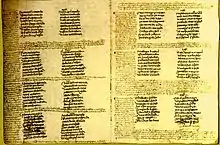Hernando del Pulgar
Biography
Hernando del Pulgar (1436 – c. 1492) was a Castilian Spanish writer of possible converso origin.
He was born at Pulgar (near Toledo) and was educated at the court of John II. Pulgar's father, Diego Rodríguez, was a scribe in Toledo, an office often reserved in the period for conversos. Henry IV made him one of his secretaries, and under Isabella he became councillor of state, was charged with a mission to France, and in 1482 was appointed historiographer-royal. He is said to have died in 1492.
Works

His Crónica de los Reyes Católicos, was wrongly ascribed in the first printed edition (1545) to Antonio de Nebrija, who had composed a Latin history based on Pulgar's manuscript. This work is commonly supposed to be propaganda for his patrons, Catholic Monarchs of Spain Queen Isabella and King Ferdinand. Nevertheless, it is often critical of their policies and admonitory in its insistence that monarchs need to respect moral and spiritual ideals.[1]
Pulgar's Claros varones de Castilla (1486), a series of portraits of eminent nobles, ecclesiastics, and men of learning, provides interesting insights into the court of Henry IV. These portraits were published together with Pulgar's Letras (Burgos, 1486), a body of epistolary work composed of 32 letters directed to both well-known and anonymous correspondents. This epistolary is one of few 15th century collections composed in a Romance language and are an example of Humanistic prose of the Renaissance. Pulgar also composed a gloss (ca. 1485) on the ''Coplas de Mingo Revulgo'', a work attributed to either Iñigo de Mendoza or Pulgar's brother.
References
- David A. Boruchoff, "Historiography with License: Isabel, the Catholic Monarch and the Kingdom of God,” Isabel la Católica, Queen of Castile: critical essays (New York: Palgrave Macmillan, 2003), 225–94.